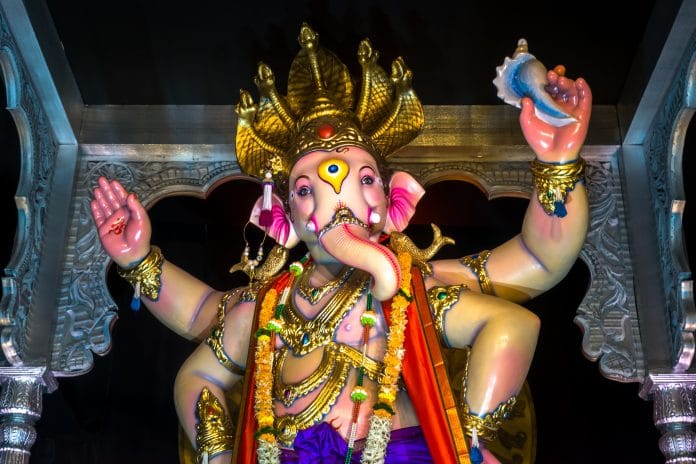I remember when I first showed my son an illustrated Bhagavad Gita—Our Most Dear Friend by Visakha. He was two years old and was too young for the text, but we gazed at the pictures together while sitting in our sunny living room as the fireplace warmed our feet. There were pictures of the Kurukshetra (the epic battle in the Mahabharata that was the impetus for the Gita), of Lord Krishna and of many beautiful things in nature, such as swans, peacocks, butterflies and lotuses.
Then came a page showing a little girl praying to Lord Krishna, who was pictured emerging from the clouds in the sky. I remember we paused at that page for quite some time, and I could feel a calmness wash over my son, as though he recognized something important in that image and wanted to take the time to absorb it.
“That’s Lord Vishnu,” I explained. “He’s also called Krishna. Vishnu is inside all the things in the world. He’s inside you and inside me.”
I doubt if he understood what I was saying, but I couldn’t help but wonder: do children intuitively have a concept of a Supreme Being? Do they feel that they are a part of something larger?
Through the years, we returned to Our Most Dear Friend many times and read other books about Hindu mythology—stories about Rama and Sita, Hanuman and Ganesh. All of the books had great stories to tell, but none of them answered that singular question which I’m sure was lurking in my son’s head: what is God?
Such a simple and elemental question, the answer to which is the foundation of spiritual education and of forming a relationship with God. Yet how could I distill this answer into a 60-second snippet? Do I explain “God” as having a human form, as presented in the many Hindu stories, or was my son capable and ready to comprehend “God” as something more intangible? A recent Newsweek post cited that children see “God” as anything from a warm and forgiving surrogate parent to a strict punisher, and that parenting dictated a child’s view of God. What did I want my son to understand as “God?”
”God is energy,” I told him, “that is inside everything—inside all the animals and plants, inside our house and inside you. It makes things move, feel and love. It’s an energy that binds together all the things in our universe.” I explained that we have different names for this energy (e.g., Brahma, Vishnu, Shiva, Lakshmi) that we can pray to for strength, but that they are all the same thing.
I decided to explain God this way because it was a reflection of the Vedanta philosophy with which I was raised and ascribe to—a philosophy that acknowledges the divine in all things, living or not. This belief is the reason why my husband and I don’t swat flies (in front of the kids at least), why we teach the kids not to step on bugs, why we choose to be vegetarian and why we don’t step on books or newspapers—which to us are “living” objects because they house the eternal flame of knowledge.
I hope my son is able to connect my explanation of “God” with the ideals and beliefs we practice as a family. I think he can. As he grows older, he will likely seek and explore his own ideas about the existence (or not) of a Supreme Being—an inalienable freedom of thought that we as Hindus encourage. For now, I hope he develops a respect toward all people and a reverence for the beauty and fragility of our planet. For now, these things are his “God.”
Photo by Sonika Agarwal on Unsplash


































[…] How Do You Explain God to Kids from a Hindu Perspective […]